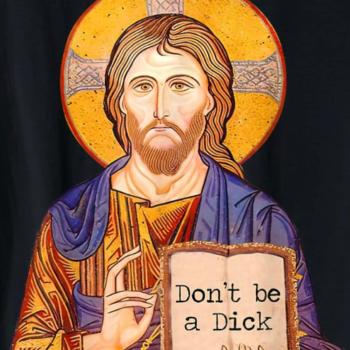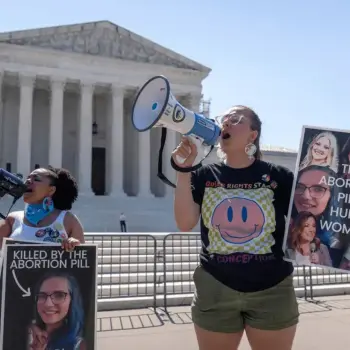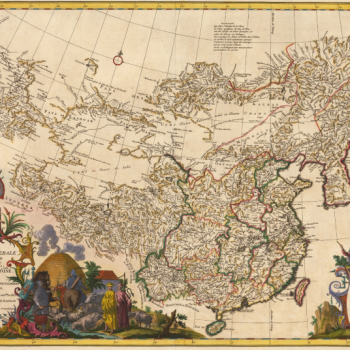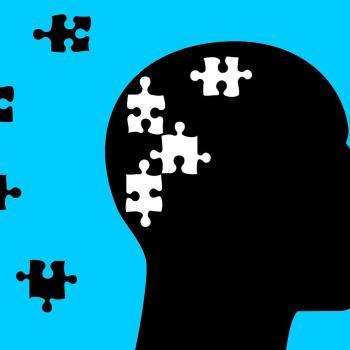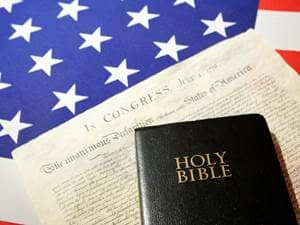
When a student asks when religion became so politicized in the U.S., I typically respond asking them how much time they have.
Because, for as long as there’s been some thing we call “religion,” it has shaped, and been shaped by, power and politics. But, with elections coming in just a few months, how long has religion in the U.S. has been politically charged by questions of identity, by the so-called “religious right,” and its emphasis on issues of sexuality, race, and “American” values?
To varying degrees and in different ways, these so-called “culture wars” have shaped U.S. politics for decades. And to understand the way they will shape politics — and of course, the elections — in 2024 it’s good to dive into that history, as I often do with students in my introduction to religion in the U.S. courses.
Shock and three aftershocks.
Culture wars are nothing new. From pagans clashing with Christians over statues and shrines in the Roman Empire to movements for liberation and change in the 1960s being met with conservative backlash, conflict between social groups and the struggle for their values and practices to dominate over those of others has raged for centuries.
In the U.S., culture war flashpoints have shifted over the years, including everything from abortion to pornography, homosexuality to multiculturalism. The front in this election year’s conflicts over values, morality and lifestyle has coalesced around issues related to gender, race and sexuality, especially as they are taught or represented in schools, libraries and other public institutions.
In 1990, sociologist Robert Wuthnow famously observed that American religion had undergone a seismic shift in the decades following World War II. In The Restructuring of American Religion, he wrote that as allegiances to specific denominations — whether Methodist or Roman Catholic, Jewish or Presbyterian — waned, religious allegiances realigned around conservative and liberal poles, which cut across denominational affiliations. In other words, whereas to be Lutheran meant one thing in the early 20th-century and Baptist another, in the post-WWII U.S., there were now liberal and conservative Lutherans, traditional and progressive Baptists split along more political lines.
Twenty years later, Robert Putnam and David Campbell focused their attention on the last fifty years, when, they believe, there were further tectonic shifts — what they called “a shock and two aftershocks” — that shook up the American religious landscape.
The shock came during the so-called “long Sixties,” as a revolutionary youth culture altered just about every institution and sector of society, including our notions of conventional religion and morality. Marginalized groups gathered together within powerful coalitions and movements (e.g., Civil Rights, Black power, Chicano, feminist and gay rights), demanding equal rights and challenging “normative American culture,” as historian Andrew Hartman calls it. This corresponded with a rapid pluralization of the religious cultures in the U.S., with the construct of a predominantly white, Judeo-Christian normative culture being met with a profusion of Eastern philosophies, non-WASP (white Anglo-Saxon Protestant) Christianities and the first permutations of what we now refer to as the “spiritual, but not religious” revolution.
The first aftershock was a counter-reaction to this seismic shift in U.S. culture and religion. As white Christian privilege receded and religious plurality became the norm, a conservative backlash coalesced around the Religious Right in the 1970s and 80s, which featured a coalition of evangelicals and fundamentalists advocating for social and political conservatism, chafing against the separation of church and state and desiring a return to what they imagine as the U.S.’s racial, moral, sexual and cultural “status quo.”
It was shortly after, in 1991, that sociologist James Davison Hunter introduced the notion of “culture wars” (from the German Kulturkampf) to describe the realignment of U.S. politics and culture following the shock-and-aftershock of the previous decades. Just a year later, Pat Buchanan’s speech at the Republican National Convention helped lock it into public consciousness. Polarizing around key, hot-button issues such as abortion and race, homosexuality and gun politics, a post-Cold War America featured prominent, evangelical voices that transferred the perceived threat of communism to what they saw as the domestic evils of shifting notions around gender roles and sexuality, as outlined by historian Kristin Kobes Du Mez in Jesus and John Wayne.
The second aftershock — a reaction to this counter-reaction — featured the dramatic rise in the “Nones” and the “spiritual-but-not-religious,” since the 1990s. As part of their shift away from traditional religious institutions, the increasing number of people who claimed, “no religion,” also drifted toward more progressive positions on gender, race, culture and education. They supported transgender and gay rights, advocated for racial justice and wanted to see more representation for such subjects in school curricula, publishing and popular culture. There were numerous political gains for these groups over the last ten years of the 20th-century and the initial decade-and-a-half of the twenty-first, with the election of America’s first Black president in 2008 and the U.S. Supreme Court striking down all state bans on same-sex marriage, legalizing it in all fifty states in 2015.
Now, we are witnessing what might be deemed a third aftershock in the wake of more progressive policies around race and issues of sexuality and gender during, and in the immediate aftermath, of the Obama era. A movement more than 60 years in the making, contemporary culture warriors have met what they see as a further, secular disintegration of traditional American values with anger and backlash, feeling like politicians and the nation itself no longer represent their values and worldviews.
In this third aftershock, the key battleground remains the schools, what Hartman called in his book A War for the Soul of America, “the institution most counted on to ensure the reproduction of American norms.” Grassroots conservatives have fought to reclaim control over local school boards, shape state curriculums, and ban books at the community libraries. At the same time, higher education has also come under fire, with conservatives decrying what they see as universities overrun by elites pushing a “woke” agenda of affirmative action (including diversity, equity and inclusion — or DEI — programs), moral relativism, critical race theory and antisemitism.
The persistent power of politicized religion.
Looking ahead to November, the culture wars are at the top of many voters’ minds. While the economy, gun control, immigration and crime remain top issues, the culture wars lay not too far behind.
But as we get caught up in the headlines around transgender rights, critical race theory, reproduction rights or the “woke” agenda in the months to come, it’s important to remember we’ve been here before. Understanding the culture wars’ history, and their amorphous shape over the preceding decades, helps us put them into the proper context of U.S. politics and shifting dynamics of wielding “religion” for the sake of political power.
They also highlight how the current contours of the culture wars in the U.S. are still very much about the shift from white Christian privilege to religious plurality in American institutions, whether they be educational, social or political.
Though that privilege is certainly waning, and has been for decades, its power to rally a broad swathe of the U.S. electorate remains evident and, for the foreseeable future, painfully polarizing.
7/9/2024 7:19:30 PM
